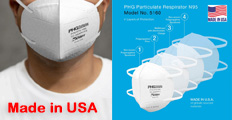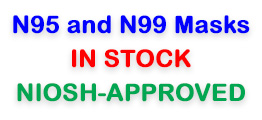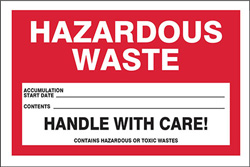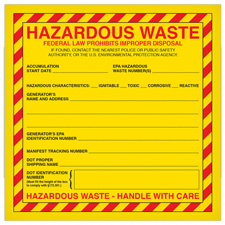



Find all of your laboratory and workplace safety supplies at Safety Emporium!
 Pyrophoric |
 Glossary Index |
 REACH |
| MSDS Topics |
Free Sites | FAQ's | Regulations | Glossary | Software | Suppliers |
| Books | Forum | Poll | Fun stuff | Quiz | Store | |
| Understand your MSDS with the MS-Demystifier | Search ALL our MSDS info | |||||

Get your hazardous waste labels from Safety Emporium.
The Resource Conservation and Recovery Act (RCRA) of 1976 gave the U.S. Environmental Protection Agency (EPA) the authority to control hazardous waste from "cradle-to-grave." This includes the generation, transportation, treatment, storage, and disposal of hazardous waste. RCRA also set forth a framework for the management of non-hazardous wastes.
1986 amendments to RCRA enabled EPA to address environmental problems that could result from underground tanks storing petroleum and other hazardous substances. RCRA focuses only on active and future facilities and does not address abandoned or historical sites (see CERCLA).
In 1984, the Hazardous and Solid Waste Amendments (HSWA) were added to RCRA that required phasing out land disposal of hazardous waste. Some of the other mandates of this strict law include increased enforcement authority for EPA, more stringent hazardous waste management standards, and a comprehensive underground storage tank program.
NOTE: We may collect a share of sales or other compensation from the links in the following list:

Get your hazardous waste labels from Safety Emporium.
Some of the information required by RCRA is the same information that is found in a Safety Data Sheet. After all, a hazardous waste is generated after one uses a hazardous chemical. Therefore, one will sometimes find certain RCRA, TSCA and SDS information in the same sources.
See also: ATSDR, CERCLA, EPCRA, TRI, SARA, TSCA.
Additional definitions from Google and OneLook.
Entry last updated: Sunday, January 8, 2023. This page is copyright 2000-2025 by ILPI. Unauthorized duplication or posting on other web sites is expressly prohibited. Send suggestions, comments, and new entry desires (include the URL if applicable) to us by email.
Disclaimer: The information contained herein is believed to be true and accurate, however ILPI makes no guarantees concerning the veracity of any statement. Use of any information on this page is at the reader's own risk. ILPI strongly encourages the reader to consult the appropriate local, state and federal agencies concerning the matters discussed herein.